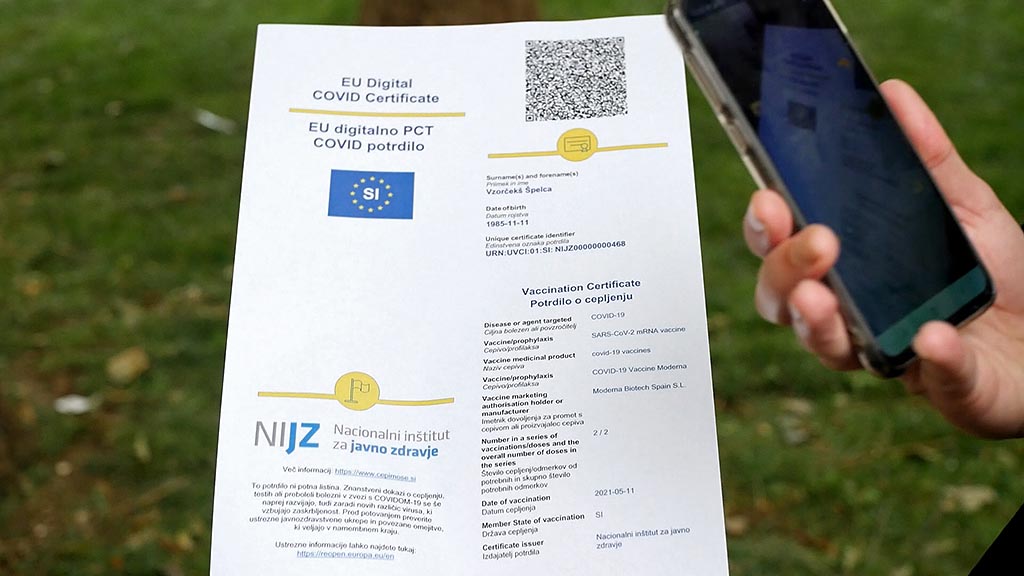By: UKOM
The COVID-19 update press conference was yesterday attended by the State Secretary at the Ministry of Health, Franc Vindišar, State Secretary at the Ministry of Economic Development and Technology, Simon Zajc, and Maja Bratuša, who opened the press conference by presenting the latest epidemiological data.
282 new COVID-19 infections were confirmed yesterday, 47 more than on Sunday a week ago, indicating that the epidemiological situation in the country is deteriorating rapidly. The number of active cases has approached 10,000; according to the National Institute of Public Health (NIJZ), Slovenia currently has 9791 cases. According to data published today, the 14-day cumulative incidence is 462, while the 7-day average number of new cases is 841. Over the weekend, 55 new patients were admitted to hospitals and 16 people were discharged. A total of 312 COVID-19 patients are now hospitalised, of which 74 are in intensive care units.
The share of persons over 18 who have received the first dose of vaccine is 58%, which is 49% of the whole population. The share of persons over 18 who have received a full vaccine course is 53%, which is 44% of the whole population.
Secretary of State Vindišar: RVT (Recovered – Vaccinated – Tested) rule ordinance drafted to ensure maximum protection for all citizens
Franc Vindišar, State Secretary at the Ministry of Health, presented the Ordinance on the method of meeting the condition of recovery, vaccination and testing to curb the spread of SARS-CoV-2 virus infections, which was issued last Saturday and enters into force on Wednesday, 15 September 2021.
The RVT rule must be met by all employees and persons who work for an employer on any other legal basis or are self-employed.
The conditions of the RVT rule remain unchanged. The only change affects recovered persons, who to comply with the rule must produce proof of a positive PCR test result that is older than 10 days, unless a doctor determines otherwise, but not older than 180 days. Slovenia thus brings this condition in line with most Member States of the European Union.
For the needs of work, the RVT rule can also be met by screening with the rapid antigen self-test, which is performed once a week at regular intervals. In this case, the means for testing are provided by the employer or self-employed person. In the event of non-compliance with the recovered/vaccinated/tested rule, the employer may apply measures in accordance with the regulation governing safety and health at work and the regulation governing employment relationships, and collective agreements. Verification of meeting the recovered/vaccinated/tested rule at the workplace shall be organised by the responsible persons carrying out or organising the work.
State Secretary Vindišar emphasised that rapid self-tests enable people to go to work. The rapid self-test, however, does not allow persons to acquire the QR code and does not grant them access to other services.
The RVT rule must also be met by persons who are service users or who are involved in or present in providing services. In this case, the costs of testing are covered by the individuals themselves.
The RVT rule must also be met by people in prison facilities, correctional facilities, foreigners’ centres, asylum and integration homes upon admission to accommodation or after return to accommodation, if the absence lasted for more than 48 hours, in which case testing costs are covered by the state.
The RVT rule shall not be mandatory for:
- persons under 12 years of age,
- persons who bring or take a child or a pupil to kindergarten, 1st, 2nd or 3rd grade of primary school, music school up to and including 2nd grade, primary school with an adapted programme or institution for the education of children and adolescents with special needs,
- persons who accompany a child under the age of 15 or a person unable to take care of themselves to their medical appointment, and
- pupils and students using public transport.
There are no changes to the rules on face masks. Therefore, face masks remain mandatory indoors and in outdoor spaces where the minimum distance of 1.5 metres between persons cannot be maintained.
State Secretary Zajc: the Government’s new preventive measures are aimed at protecting the health of us all
Simon Zajc, State Secretary at the Ministry of Economic Development and Technology, stressed that, from Wednesday on, the recovered/vaccinated/tested rule must be met by all persons who are service users or are involved in or present in providing services – all consumers.
The exemption from this rule is accessing the supply of basic necessities, meaning that a person entering a store that mainly sells groceries does not have to meet the recovered/vaccinated/tested rule. However, if the grocery store is located inside a shopping centre, the person has to present a certificate of compliance with the recovered/vaccinated/tested rule.
The same applies to the specialised stores that sell pharmaceutical, medicinal, cosmetic or toilet products.
All consumers that are not vaccinated or are without documentation indicating recovery from COVID-19 have to be tested every 48 (rapid antigen test) or 72 hours (PCR test). The testing costs in this case are covered by those individuals themselves.
Stores, shopping centres, restaurants, tourist accommodations, and all organisations where work processes are carried out have to prominently display the notice about the requirement of compliance with the recovered/vaccinated/tested rule at the point of entry to the premises and also carry out the recovered/vaccinated/tested rule compliance checks at the points of entry. If consumers do not meet the recovered/vaccinated/tested rule, they cannot make use of some services.
Source: gov.si

